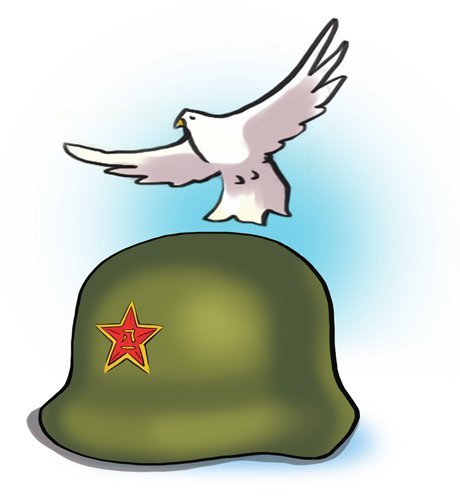
Illustration: Liu Rui/GT
A grand military parade was held in the Zhurihe military training base in North China's Inner Mongolia Autonomous Region Sunday to celebrate the 90th anniversary of the founding of People's Liberation Army (PLA). Chinese President Xi Jinping, also general secretary of the Communist Party of China (CPC) Central Committee and chairman of the Central Military Commission, inspected the troops at this historic occasion. It was the first time that China commemorated Army Day with a military parade since 1949.
China expects to convey a signal that the Chinese army is powerful with improved combat capacity to protect its people, safeguard its national sovereignty, security and development interests, and is willing to contribute to maintaining world peace. As Xi said, "The world is not all at peace, and peace must be safeguarded."
In any country, it is a duty beyond reproach to defend the state and the people. However, foreign media outlets and in particular those from the US have delivered a number of biased reports once again on the parade. For example, they claimed the PLA was flexing its muscles through this parade and trying to use force to make other countries yield. They hyped how the new weaponries displayed at the parade pose a threat to regional peace.
This viewpoint mirrors the way the US government sees China. On June 6, the Pentagon published the Annual Report to Congress: Military and Security Developments Involving the People's Republic of China 2017. The report criticized Beijing for its "military actions" in the South China Sea and the construction of a "military base" in Djibouti. It hyped up threats posed by growing Chinese military strength again.
Washington has kept hyping the idea that China is a threat in recent years. Their point of view follows a simple logic: The Chinese military has developed too quickly, posing a challenge to Washington's dominant position in the region and the world at large, which will lead to a military conflict between the two countries. In other words, this is the logic of the "Thucydides' trap," a belief that China's rise has changed the existing power structure and made a military collision with the US inevitable.
China's military development has made remarkable progress in recent years, with a steady increase in its national defense budget and a host of new aircraft carriers and weapons. Meanwhile, the country is engaged in an unprecedented defense and army reform, largely improving the PLA's modernization and capacities for joint operations.
Nonetheless, despite its upgraded military power, China has never changed its defensive national defense policy. Beijing still lags behind Washington in military strength and its defense spending as a percentage of GDP is much lower than that of Western countries. China seeks furthering its military relations with the US-led West.
At a meeting during the G20 summit in Hamburg in early July, both Xi and his US counterpart Donald Trump agreed to a visit by the chairman of the US joint chiefs of staff to China in August, a dialogue between the joint staffs of the two countries' militaries in November and the Chinese Navy's participation in the US-led 2018 Pacific Rim military drill.
All these show positive signs for Sino-US military ties. It is fair to say that China has no intention to challenge the US in military developments, but has done a lot to promote mutual trust between the two militaries.
However, the US has adopted a dual-track strategy by engaging China on the one hand and scheming to play tricks on the other in a wider move to contain China. Such a double-dealing policy is in no way conducive to peace and stability of bilateral military ties.
There is no denying that the two countries hold different views in the military arena and some of the divergences are striking. But that does not mean they are irreconcilable. History stays in the past and the "Thucydides' trap" may not fit this age. China and the US can live in peace. As Xi said, "The vast Pacific Ocean is big enough to accommodate both China and the US."
The author is an assistant research fellow at the China Institute of International Studies. opinion@globaltimes.com.cn
